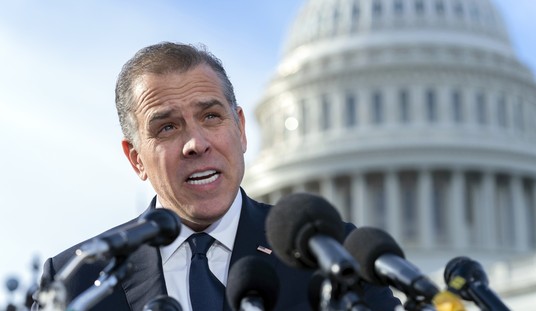There's an apocryphal story about a conversation between F. Scott Fitzgerald, who wrote a great deal about the vastly rich in the United States in the early 20th century, and Ernest Hemingway, a contemporary of Fitzgerald's who wrote on more earthy topics. Fitzgerald reportedly told Hemingway, "The very rich, they are different from you and me." Hemingway supposedly replied, "Yes, they have more money."
Fitzgerald may have been right. Now, we have a recent Rasmussen survey that points to the American "elite," and how their attitudes differ wildly from mainstream Americans. Rasmussen, in this survey, identified "elites" as follows:
The survey is a first-of-its-kind look at the views of the American Elite – defined as people having at least one post-graduate degree, earning at least $150,000 annually, and living in high-population density areas (more than 10,000 people per square mile in their zip code) – and compares them to what the average American thinks. The Elites represent 1% of the U.S. population but have an outsized voice on public policy in the United States, with their views seeming somehow to dominate the national conversation.
For comparison, our Susitna Valley community in Alaska has 2.8 people per square mile and a median household income of $71,536, as of the 2020 census. Here, though, is the mildly shocking (but not surprising, if you've been paying attention) bit; that being the attitudes of these elites, particularly when it comes to controlling us schlubs out here in flyover country.
Elite thinking, as it’s termed, is under attack – and rightly so – for being out of step with the rest of the country. Below, we highlight some of the profound attitudinal differences between elites and average Americans:
- In a time when most Americans have suffered a loss of real take-home pay, 74% of elites say they are financially better off today than in the past versus 20% of all Americans.
- Nearly six in ten say there is too much individual freedom in America – double the rate of all Americans.
- More than two-thirds (67%) favor rationing of vital energy and food sources to combat the threat of climate change.
- In stark contrast to the rest of America, 70% of the Elites trust the government to “do the right thing most of the time.”
- Two-thirds (67%) say teachers and other educational professionals should decide what children are taught rather than letting parents decide.
- Somewhere between half and two-thirds favor banning things like SUVs, gas stoves, air conditioning, and non-essential air travel to protect the environment.
- About six of ten elites have a favorable opinion of the so-called talking professions—lawyers, lobbyists, politicians, and journalists.
- President Joe Biden enjoys an 84% job approval rating from this group – roughly twice as high as the general public.
This, folks, is French Revolution-territory stuff. Let's take a look at some of the more horrifying bits of attitude.
First, nearly six in 10 say there is too much personal freedom in America. This begs the question, "And therefore, what?" It's easy to think that these urban elites want to restrict the rest of the country, but what about them, in their urban enclaves? Will they submit themselves to the same kind of restrictions? Because in authoritarian societies throughout human history, the elites have never suffered from the clamps they place on the rest of the people.
See Related: Former MSNBC Host: Democrats Need to Vote to Beat 'Rural People, Their Craziness About the Cult'
Second, more than two-thirds are in favor of rationing energy and food resources - naming the bugaboo of climate change. This is a multi-faceted issue; if pressed to name a policy solution to this concern, one could only describe a totalitarian takeover not only of agriculture but of the entire chain of transport and distribution--all of which, of course, is fossil-fueled.
And on that note, one-half to two-thirds favor banning SUVs, gas stoves, air conditioning, and - get this - non-essential air travel. Let's focus on that last bit for a moment; just who gets to decide what's "essential," where air travel is concerned? Would my wife and I flying to the lower 48 to see our kids and grandchildren fall under the term "essential?" Would we be rationed to one trip a year? Who gets to decide this?
If you look at the whole list, here's the thing that stands out: These "elites" favor more control. It's always more control. They know better than the rest of us, you see, and they are willing to see the full power and force of government used to restrict the rest of us. And look at the restrictions they favor, ranging from SUVs to steaks -- most of these won't have much impact on wealthy attorneys and lobbyists in urban enclaves, but they sure as hell will affect the rest of us.
Feature, not bug.
These folks are of a sort with one Arthur Wellesley, the Duke of Wellington, who supposedly opposed passenger railways, claiming they would "foster unrest by allowing the lower orders to move too freely about." Make no mistake; the elites surveyed here harbor that same attitude towards the rest of us. They know better, you see, than we do about what's good for us. They really think that way, and this survey makes that pretty damn clear.
Here's the catch: No matter what happens this November, these "elites" aren't going away.
See Related: What Keeps Global Elitists Up at Night? A Possible Second Trump Presidency
To quote another author, a personal favorite of mine, Robert Heinlein:
Political tags — such as royalist, communist, democrat, populist, fascist, liberal, conservative, and so forth — are never basic criteria. The human race divides politically into those who want people to be controlled and those who have no such desire. The former are idealists acting from highest motives for the greatest good of the greatest number. The latter are surly curmudgeons, suspicious and lacking in altruism. But they are more comfortable neighbors than the other sort.
If you're reading these words, you are, like me, probably among the surly curmudgeons. And we will forever be contending against the first sort. That is, I think, an inescapable fact of human existence; it will last as long as people do. But in any such cultural conflict, it's vital to know what the other side is thinking, and this survey has given us a disconcerting, but not surprising, look into exactly that.













